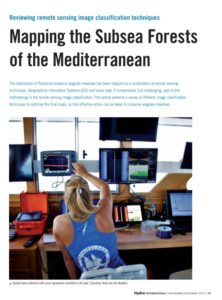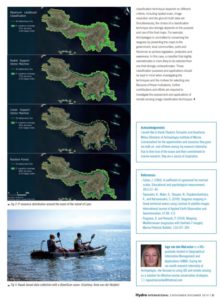In the featured article of the global magazine for hydrography “Hydro International” a young scientist from Holland, Inge van den Meiracker, who as part of the MSc in Geographical Information Management and Applications at the University of Utrecht, joined Archipelagos Institute of Marine Conservation for 6 months. During her internship, Inge took an active part in the research for the mapping of the distribution of Posidonia oceanica meadows in islands of the Aegean Sea, using GIS and remote sensing technology.

Her hard work was recognised in the November/December issue of Hydro Magazine, which you can read here (pages 19-21).
This article, in a way, also represents the efforts of hundreds of students and young researchers from all over the world who join Archipelagos Institute to contribute to the research and conservation actions, while at the same time gain hands-on skills and experience to further their career in science. They take part in the applied research that Archipelagos Institute has been conducting on the open sea for over 20 years, using constantly improving equipment and infrastructure and aiming to contribute to the efficient protection of the special natural wealth of our seas.
If we do not cover the large knowledge gaps about life in our seas and the ways in which this is being impacted by human activity, it is impossible to enforce efficient conservation measures. All of us in Greece, in the country where marine science started for the first time in the world 2.500 years ago, share today an even greater common responsibility for the protection of our marine resources, as within only a few decades they are being seriously impacted by human activity. For this common aim, we all (private and public organisations, universities, research institutes, citizens associations and authorities) need to contribute everything we can before it’s too late.







